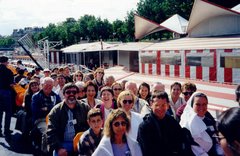CNN NEWS
Cyprus to tempt tourists with saints' bones
http://edition.cnn.com/2007/TRAVEL/05/15/cyprus.reut/
NICOSIA, Cyprus (Reuters) -- The bones of martyred saints and somber shrines may not be at the top of every tourist's must-see holiday wish list.
But the Mediterranean island of Cyprus, better known as a major European sun-and-sea spot, is determined to delve into its rich cultural heritage and exploit the budding -- and more wholesome -- market of religious tourism.
"We are more than just a sand and sea and sex destination," said George Michaelides, chairman of the Cultural and Special Interest Tourism Association.
Industry officials say about 100,000 of the island's 2.5 million tourists already come for the cultural and religious monuments and the market has seen a boost since Dan Brown's bestseller "The Da Vinci Code" made religious quests popular.
"Cyprus has always been associated with religion. In earlier times there was no ship going to the Holy Land without stopping at Cyprus. We are known as the island of saints," Michaelides said.
According to the World Tourism Organization, 300 to 330 million pilgrims visit the world's key religious sites every year. Cyprus is eager to take a big bite out of this growing market and boost the island's main industry.
In cooperation with the powerful Church of Cyprus and tourism officials it is launching religious tours for the first time this summer.
"Cyprus packs a huge amount of monuments in such a small space," said Vakis Loizides, a tourist officer at the Cyprus Tourism Organization (CTO). "The island's special relationship with saints, like Lazarus and Helen, make it very attractive."
Visitors can go on a tour tracing the footsteps of Saint Paul, who traveled from Antioch to Cyprus in 45 AD, and visit the pillar in the town of Paphos where he was tortured and, according to his second epistle to the Corinthians, given "forty bar one lashes" for preaching Christianity.
Or they can visit the church of Saint Lazarus, who church tradition says came to Cyprus after his resurrection by Christ, and served as a bishop on the island.
Most of his bones were sent to Constantinople in the 9th century but the faithful can see his skull, on display in a glass-topped box in the church.
Da Vinci Code
"We are seeing an increase in demand," said Angelos Mylonas, manager at Mantovani Plotin Travel. "After 'The Da Vinci Code', there is an interest from people to see Greek Orthodox churches."
Scattered over the Troodos mountains, Cyprus's 10 medieval timber-roofed churches, listed as UNESCO world heritage monuments for their stunning wall paintings, are at the top of many religious tourists' lists, he added.
"Tourists already know where they are going and what they want to see. They are extremely well read, they know places not even we are aware of," Mylonas said.
A 300,000 Cyprus pound ($700,000) tourist office campaign part-funded by the European Union and the Cypriot government is aimed primarily at travelers from Greece and Orthodox nations of the former communist bloc like Russia, but also at Orthodox communities in the United States, Britain and Australia.
The CTO is publishing religious tourism guides in several languages and a traveling exhibition of Orthodox artifacts is also planned.
Religious tolerance
Officials say that apart from the large number of shrines spanning millennia, Cyprus's comparative advantage is that it houses monuments of different religions, including one of Islam's most important mosques, the 648 AD Hala Sultan Tekke in the town of Larnaca.
"Cyprus is tolerant to various dogmas. Tourists can see Muslim and Orthodox monuments co-exist. This is very special," Loizides said.
He said the Church, originally skeptical about anything to do with tourism which it associates with lewd behavior, is now eager to promote "religious culture tours". It is cooperating in planning festivals and ceremonies so tourists can attend them.
"There is international interest in religious tourism. Given the violence and wars in the world, there is a belief that if developed properly, it can lead to a dialogue between cultures," he said.
Others in Cyprus see the development of religious tourism from a more practical perspective.
"This will help diversify the product of the island, change its image," Michaelides said. "These people come off-season and stay longer than the average tourist. They are better spenders, who go around and not just from the hotel to the pub."
Revenue Secrets from Faith Tourism Experts
5 Step Introduction to the Religious Travel Market
Daily Religious Tourism News
Religious Travel Links
About Me

- kevinjwright
- Kevin J. Wright is one of the world's most recognized religious travel and hospitality authorities. He founded and served as President of the World Religious Travel Association, the leading organization dedicated to the 300 million traveler faith tourism industry. He also served as Chairman of the World Religious Travel Expo, drawing more than 30 countries from around the world. Wright has been interviewed by the CBS Early Show, TIME Magazine, USA TODAY, Wall Street Journal, The New York Times, National Public Radio (NPR), National Geographic, Forbes Traveler, Los Angeles Times, Boston Globe, and dozens of other media outlets. He is the author of four travel guidebooks.
Faith-based Tourism

300 million travelers worldwide
Blog Archive
- January (1)
- December (2)
- November (2)
- October (5)
- September (3)
- August (8)
- July (1)
- June (3)
- May (3)
- April (3)
- March (9)
- February (5)
- January (9)
- December (4)
- November (2)
- October (16)
- September (8)
- August (6)
- July (3)
- June (18)
- April (2)
- November (2)
- September (11)
- August (7)
- July (12)
- June (13)
- May (5)
- April (6)
- March (4)
- December (2)
- November (6)
- October (2)
- September (2)
- August (3)
- July (8)
- June (15)
- May (4)
- April (7)
- March (2)
- February (5)
- January (5)
- December (5)
- August (1)
- July (1)
